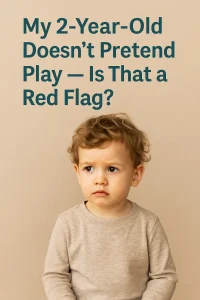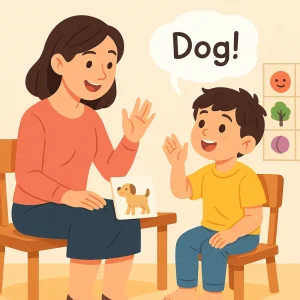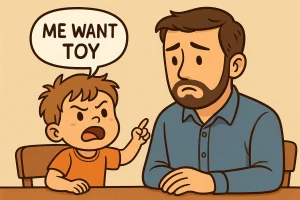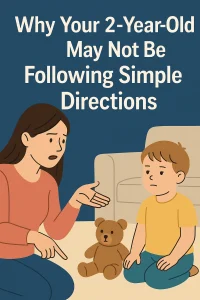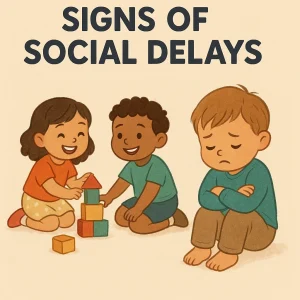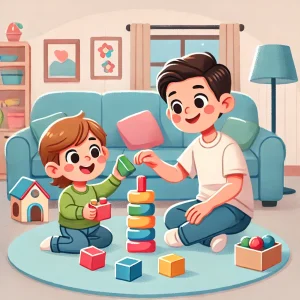How Social Stories Help Manage Anxiety in Kids with Autism & ADHD
Last Updated: February 15, 2025
Anxiety can significantly impact children with Autism and ADHD, making daily interactions feel daunting. Social stories are an effective tool in managing this anxiety, providing structured narratives that explain social norms and expectations, thereby reducing stress. These tailored guides help children understand and navigate complex social situations, fostering independence and confidence. At Wellness Hub, we offer resources that support these efforts, empowering parents and therapists with the tools they need to make a positive difference in the lives of these children. Let’s delve into how social stories can transform anxiety management for children with Autism and ADHD.
Parenting kids with special needs is tough—Our Social Stories make it simpler. Download now and give your child the tools to thrive!
Start HereWhat Are Social Stories and How Do They Work?
1. Understanding Social Stories for Autism
Social stories are simple, short narratives designed to help children with Autism and ADHD understand social cues and routines. They outline what to expect in various situations, helping these children feel more prepared and less anxious about new experiences.
2. The Power of Social Stories in Anxiety Management
By providing clear expectations and consistent details, social stories reduce anxiety by making the world more predictable for children with Autism and ADHD. Knowing what to expect in social scenarios can calm nervousness and improve overall engagement.
How Do Social Stories Help Manage Anxiety in Children with Autism?
1. Providing a Sense of Security and Routine
Social stories help create a predictable environment for children with Autism and ADHD, which enhances their sense of security. By clearly outlining what to expect in various situations, these stories reduce surprises that can lead to anxiety.
2. Reducing Fear and Uncertainty in New or Stressful Situations
Social stories prepare children for new experiences by explaining them in advance. This can be anything from a doctor’s visit to a school event, helping to ease any fear or anxiety about the unknown.
3. Encouraging Positive Behavior and Coping Mechanisms
Through social stories, children learn appropriate responses to social situations and effective ways to handle stress. These stories demonstrate useful techniques like deep breathing or asking for help, which are valuable skills for managing anxiety.
Creating Effective Social Stories for Managing Anxiety
1. Key Elements of an Effective Social Story
- Simple Language: Use straightforward, concrete language suitable for children who take meanings literally.
- Visual Aids: Include pictures or symbols to support the text and enhance understanding.
- Clear Explanations: Clearly explain both what will happen and why it happens, to help the child grasp social rules and expected behaviors.
2. Tips for Personalizing Social Stories for Children with Autism and ADHD
- Identify Specific Needs: Tailor the story to address the child’s particular challenges or fears.
- Incorporate Interests: Use the child’s favorite activities or hobbies to make the story more engaging.
- Address Triggers: Focus on scenarios that might trigger the child’s anxiety, providing solutions or coping mechanisms.
- Use Familiar Settings: Integrate familiar environments or characters to make the stories relatable and comforting.
Read more about on 6 Tips for Writing Social Stories for Kids with Autism and ADHD
Using Wellness Hub Tools to Create Social Stories
- Visual Aids: Use visual tools to match the specifics of your narrative.
- Examples and Inspiration: Explore a library of example stories to inspire your own creations, adapting them to meet individual needs.
Components of an Effective Social Story
| Component | Description | Example |
|---|---|---|
| Simple Language | Use clear, straightforward language appropriate for the child’s comprehension level. | “When I feel mad, I can take deep breaths.” |
| Visual Aids | Include images or symbols that illustrate the narrative and help explain the content visually. | Picture of a child taking deep breaths. |
| Clear Explanations | Provide explanations for why certain behaviors are expected in given situations. | “Deep breaths help calm my body down.” |
| Consistent Structure | Maintain a predictable format that helps the child understand and anticipate what comes next. | Start with a cue, follow with a response. |
The Benefits of Using Social Stories for Anxiety in Autism & ADHD
Improved Emotional Regulation and Coping Skills
Social stories help children with Autism and ADHD manage their emotions by explaining what to expect in different situations. This preparation helps them stay calm and respond appropriately, reducing anxiety and improving their ability to handle emotions in stressful situations.
Enhanced Communication Skills for Children with Autism and ADHD
Social stories teach children essential social skills, such as how to start a conversation and understand body language. This practice improves their ability to communicate and interact with others, which is often challenging for those with Autism and ADHD.
Also read: Why Social Stories Work for Children with Autism and ADHD
Building Confidence and Independence
By understanding social scenarios better, children feel more confident and capable of handling situations on their own. Social stories equip them with knowledge and skills, boosting their confidence and encouraging them to be more independent.
Simplify challenging situations like bedtime or sharing. Download our Social Stories to help your child with Autism navigate life confidently.
Click to DownloadConclusion
Social stories are a fantastic way to help children with Autism and ADHD manage anxiety by simplifying complex social situations. They enhance understanding, improve communication, and boost confidence. Wellness Hub provides essential tools for creating personalized social stories, making it easier for parents and therapists to support their children effectively. Explore our resources and see how you can help your child navigate daily challenges more confidently. Visit Wellness Hub today to start creating stories that can make a real difference. Let’s empower your child to thrive in every interaction!
Frequently Asked Questions:
1. What are social stories?
Social stories are short, tailored narratives that describe social situations in a structured and detailed way. They are designed to help children understand expected behaviors and the sequence of events in social interactions. By presenting information in a predictable manner, social stories help children grasp social cues and reduce their anxiety about new or complex situations.
2. How can social stories help my child with Autism?
Social stories can be particularly effective for children with Autism as they address the specific challenges these children face in understanding social norms and expectations. By explicitly detailing what to expect and how to respond, social stories help children with Autism navigate social complexities, which can lead to reduced anxiety and improved social interactions.
3. Can social stories reduce anxiety in children with ADHD?
Yes, social stories are beneficial for children with ADHD by providing clear and consistent guidelines on how to behave in different social settings. This consistency helps reduce the unpredictability that often leads to anxiety and stress in children with ADHD, enabling them to engage more confidently in social activities.
4. What should a social story include for a child with Autism?
A social story for a child with Autism should include simple, direct language that avoids idioms and metaphors, which can be confusing. Visual supports such as pictures or icons can also help illustrate concepts clearly. Additionally, each story should have a structured format that explains the situation, the expected behaviors, and the reason why these behaviors are important.
5. How often should my child use social stories?
The frequency of using social stories can depend on the child’s specific needs and the situations they encounter. Generally, it’s beneficial to use social stories regularly, especially before anticipated challenging situations. Repeated exposure helps reinforce learning and makes the child more comfortable with the scenarios described.
6. Can I create my own social stories for my child?
Absolutely! Many parents find that creating personalized social stories for their child allows for a more tailored approach that can directly address their child’s unique needs and preferences. Personal stories can include familiar settings and personalized details that resonate more with the child, making the lessons more effective.
7. What are the best topics for social stories for kids with ADHD?
Effective social stories for children with ADHD often focus on helping them manage transitions, understand time management, and follow processes that require attention to detail. Stories that explain the steps involved in a new activity or routine can help prepare them for what to expect and how to act.
8. Where can I find resources to create effective social stories?
MyWellnessHub offers a wide range of resources for creating effective social stories, including templates, guidelines, and customizable visuals. These tools can help you construct stories that are both engaging and educational for your child.
9. Are there examples of social stories I can look at?
Yes, WellnessHub provides several examples of social stories that you can review to understand how to structure your narratives effectively. These examples can serve as inspiration and can be adapted to better suit the needs of your child.
10. How do social stories improve communication skills in children with Autism?
Social stories improve communication by demonstrating appropriate conversational cues and responses through clear examples. They help children with Autism understand the flow of conversations, recognize emotional cues, and respond appropriately in social interactions, which are critical components of effective communication.
About the Author:
Shravanaveena Gajula
M.Sc ., Speech and Language Pathology (5+ years of experience)
Shravanaveena Gajula is a dedicated Audiologist and Speech-Language Pathologist with a BASLP and an M.Sc in Speech and Language Pathology. With experience spanning multiple settings, including Wellness Hub and Ashray Akruti, Veena specializes in a wide range of disorders from developmental issues in children to speech and language assessments in adults. Her expertise includes parent counseling, managing speech sound and fluency disorders, and creating individualized therapy programs. Veena is also PROMPT certified and an author of several insightful blogs on speech and language pathology, aiming to educate and assist caregivers in supporting their loved ones.
Book your Free Consultation Today
Parent/Caregiver Info:
Client’s Details:
* Error Message
